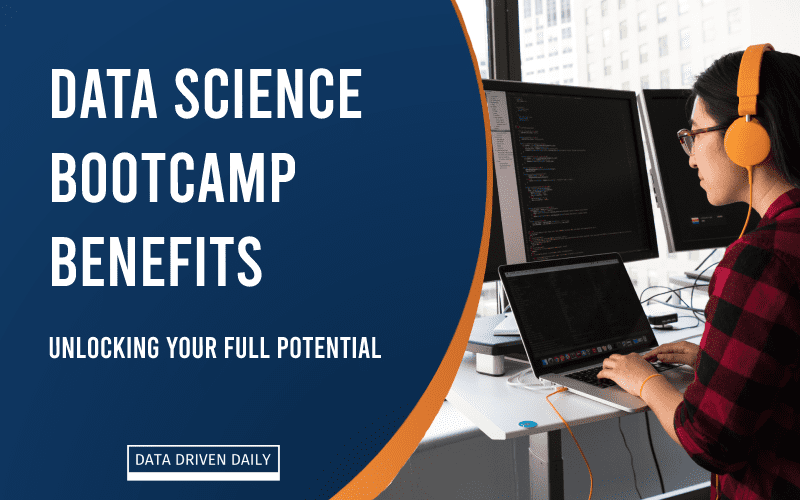If you’re considering a career in data science or looking to upskill in the field, you’ve likely come across data science bootcamps.
These intensive training programs have gained popularity in recent years, offering accelerated learning and practical experience to aspiring data scientists. In this blog post, we’ll explore the many benefits of attending a data science bootcamp and how it can help you achieve your career goals.
Plus, if you’re ready to take the plunge, be sure to check out our post on the best data science bootcamps to find the perfect fit for you.

Accelerated Learning: Fast-track Your Data Science Journey
One of the most significant benefits of a data science bootcamp is the accelerated learning it provides. These programs are designed to teach essential data science skills in a short amount of time, typically ranging from a few weeks to several months. This allows you to quickly gain the knowledge and skills needed to break into the data science field or enhance your existing skillset.
Hands-on Experience: Putting Theory into Practice
Data science bootcamps are known for their project-based curriculums, which means you’ll spend a considerable amount of time applying the theories and concepts you learn to real-world scenarios. This hands-on experience is invaluable when it comes to building a strong data science portfolio and demonstrating your capabilities to potential employers. It also helps you develop a deeper understanding of the material, as you’ll be able to see the direct impact of your work.
Networking Opportunities: Connect with Like-minded Individuals
Attending a data science bootcamp provides you with the chance to connect with fellow students, instructors, and industry professionals who share your passion for data. These connections can lead to valuable networking opportunities, potential job offers, and lasting friendships. Additionally, being part of a data science community can help keep you motivated and inspired throughout your career.
Job Placement Assistance: Land Your Dream Job
Many data science bootcamps offer job placement assistance to their graduates, including resume reviews, interview coaching, and access to exclusive job boards. Some bootcamps even go a step further by offering a job guarantee, ensuring that you’ll find a job in the field within a specified time frame after completing the program. This support can be a major advantage when it comes to landing a job in the competitive data science market.
Flexible Learning Options: Find the Perfect Fit
Data science bootcamps cater to a wide range of students, offering various formats to accommodate different schedules and learning preferences. Whether you’re looking for a full-time, part-time, or online program, there’s a data science bootcamp out there that will suit your needs. This flexibility makes it easier than ever to invest in your education and career without sacrificing your personal and professional commitments.
Learn from Industry Professionals: Gain Valuable Insights
Many data science bootcamps boast experienced instructors with real-world experience in the field. Learning from these professionals can provide you with valuable insights and practical tips that you might not find in a traditional classroom setting. Instructors can also share their industry connections, further expanding your network and potential job opportunities.
Conclusion: Invest in Your Future
The benefits of attending a data science bootcamp are undeniable. From accelerated learning and hands-on experience to networking opportunities and job placement assistance, a data science bootcamp can provide you with the tools and support you need to succeed in this exciting field. If you’re ready to take the next step in your data science journey, don’t forget to explore our list of the best data science bootcamps.
Ben is a full-time data leadership professional and a part-time blogger.
When he’s not writing articles for Data Driven Daily, Ben is a Head of Data Strategy at a large financial institution.
He has over 14 years’ experience in Banking and Financial Services, during which he has led large data engineering and business intelligence teams, managed cloud migration programs, and spearheaded regulatory change initiatives.